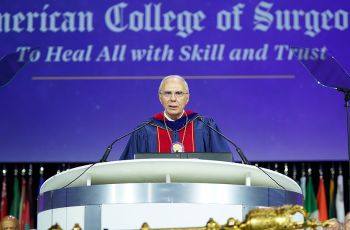January is peak resolution season — whether it’s a plan to get organized at work or home, volunteer in the community, or read more — the new year is the perfect opportunity to make a fresh start. After weeks of parties and lavish meals over the holiday season, perhaps the most common resolution out there is losing some weight and getting into shape. Here, Brad Moore, MD, MPH, associate professor of medicine at the George Washington University (GW) School of Medicine and Health Sciences, and director of the Lifestyle Medicine Program at the GW Medical Faculty Associates, offers some suggestions to move beyond the fads and misinformation that often prevents us from achieving our goals.
When trying to lose weight, which comes first, diet or exercise?
Moore: That is the wrong question if your goal is to get healthy. There is no doubt that diet is more important to promoting weight loss than exercise. You can’t outrun an unhealthy diet. It takes only a minute or two to devourer the 215 calories in a Snickers bar, but it takes about 20 minutes of running or 2 miles of walking to burn the same number of calories. To illustrate that another way, you need to burn 3,500 calories to lose one pound of body weight — that’s walking 35 miles!
Rather than a resolution to lose weight, you should be thinking about resolving to make healthier choices. Most people think that excess weight is the cause of chronic diseases such as diabetes, high blood pressure, and high cholesterol. The truth is, excess weight is just a symptom of the same unhealthy lifestyle choices that lead to those chronic diseases. If you focus on consistently making smarter lifestyle choices you will feel better, be healthier, and lose weight.
There are a lot of diets out there — Atkins, intermittent fasting, Paleo — do any actually work? Are there diet fads to avoid?
They all work, at least in the short term. Any diet that creates a calorie deficit will promote weight loss. However, when most people think of a diet, they think of changes they will make till they reach their goal weight and then abandon. That leads to yo-yo dieting where the weight is lost and then regained, often with the end result being weight gain over time. Some, such as the keto diet or the carnivore diet, may actually lead to increased risk of chronic disease.
It’s better to think about permanently changing your eating pattern to one that is healthful and sustainable over time. The only eating pattern that has been shown to promote weight loss and longevity — while also decreasing the risk of chronic diseases and even many forms of cancer — is a whole-food, plant-predominant diet. This diet is based on an abundance of unprocessed, fresh or frozen fruits and vegetables, whole grains, beans and other legumes, and nuts and seeds. Most people following this eating pattern as part of a healthy lifestyle will lose weight withoutcounting calories.
While it’s a healthier choice, a whole-food, plant-predominant diet is not what most people are used to, and change does not happen overnight. Focus on making as many positive choices as you can. Begin by avoiding processed food and drink. If you don’t recognize the ingredients on the package, it’s a processed food. Try adopting the mindset that every bite you eat should promote health and nourish your body. Include more of the healthiest foods into your daily meals. Variety is the path to good health, as well as the spice of life, so when choosing these foods, “eat the rainbow.”
How important is sleep to weight-loss goals?
Restorative sleep is the foundation of good health. It is almost impossible to achieve and sustain weight loss with insufficient sleep. Most people should strive for 7 to 9 hours of sleep a day. You will know you are getting enough if you wake up easily and don’t feel tired during the day. Studies have shown that those getting insufficient sleep — less than 6 hours — eat 300 to 600 more calories the next day and tend to choose high fat, unhealthy foods. The ill effects don’t stop with weight. Poor sleep leads to decreased immunity, increased blood pressure, blood sugar, and risk of heart disease and dementia, as well as decreased testosterone, decreased ability to build muscle, and decreased ability to learn. Adequate restorative sleep should be the first priority for good health.
Are there things to consider before committing to an exercise program?
Begin by considering why you want to exercise, what your goals are, and where you are starting from. Regular physical activity has many benefits; it lowers blood pressure and blood sugar, helps control weight, improves mood, boosts energy, and promotes better sleep. Aim for at least 150 minutes of moderate-intensity exercise, or 75 minutes of vigorous exercise, per week. Try to engage in a combination of vigorous and moderate aerobic exercises, such as running, walking, or swimming. Squeeze in strength training for at least 30 minutes twice a week by lifting free weights, using weight machines, or doing body weight exercises. If you have not been very physically active start slow and work up to those goals. Building movement into your day by walking on your commute, taking the stairs, and standing rather than sitting have significant health benefits. The only exercise program that is effective is one that you will do consistently and, preferably, enjoy.
Should I seek medical advice before getting off the couch to tackle an exercise resolution?
Most people can begin light to moderate exercise without any problem. The American College of Sports Medicine recommends medical consultation before beginning an exercise program if you don’t normally exercise and have heart disease, kidney disease, or type 1 or 2 diabetes with or without symptoms. Even if you are not diagnosed with any chronic disease, you should consult a physician if you have pain or discomfort in your chest, neck, jaw or arms at rest or during physical activity; dizziness, lightheadedness, or fainting with exercise or exertion; shortness of breath with mild exertion, at rest, or when lying down or going to bed; ankle swelling, especially at night; or a rapid or pronounced heartbeat.




